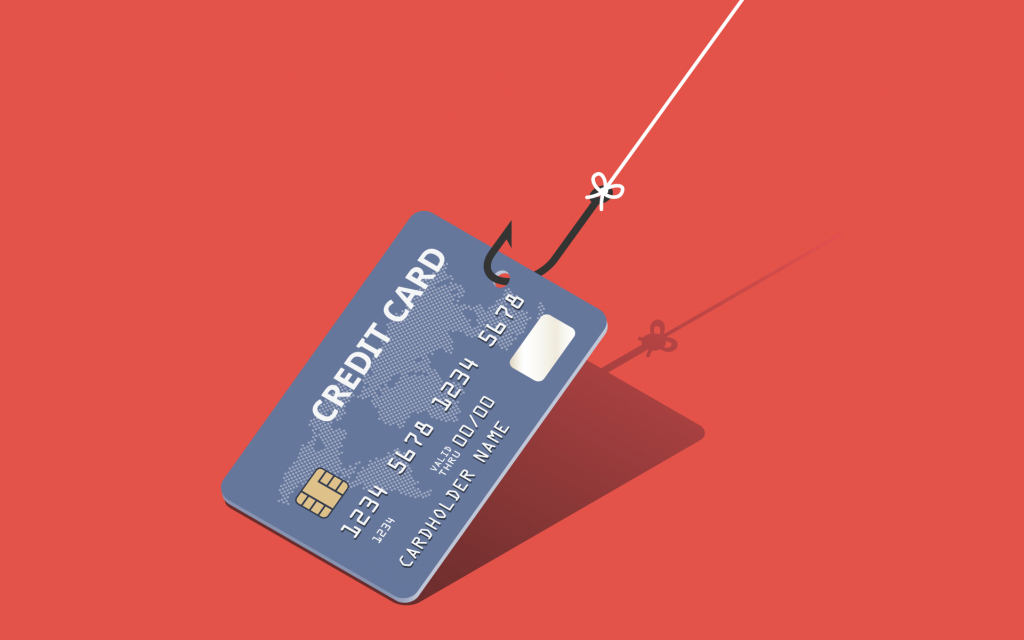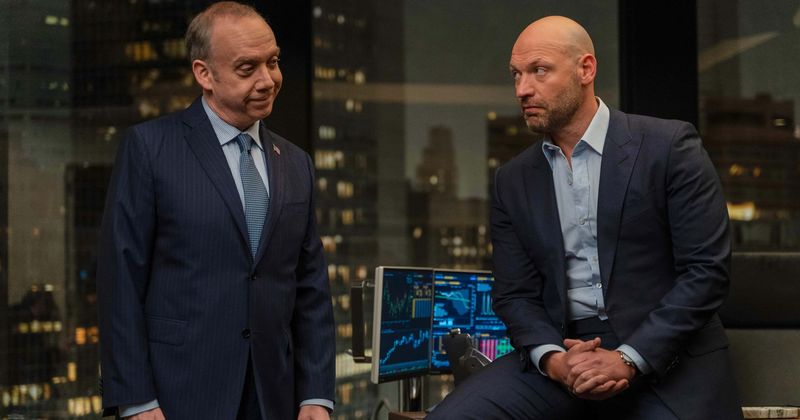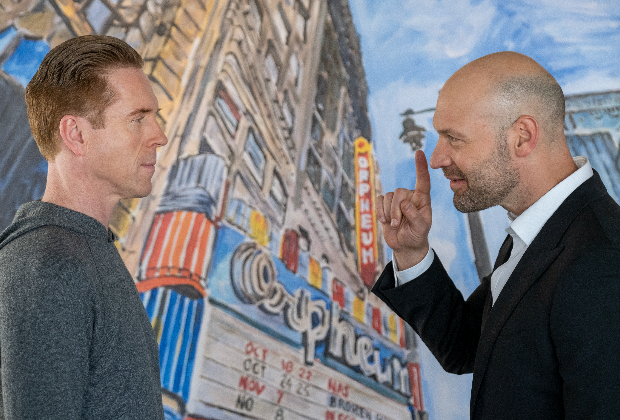
‘Billions’ finale will show sticky-icky side of federal prohibition
The gap between federal and state regulations can form a dangerous trap for buzzing entrepreneurs – Here’s how to navigate the green void
Showtime’s Billions returned from hiatus this September with a plot that’s got fans stuck like gorilla glue. The motor-mouthed series drops it’s season five finale Sunday (October 3). And trailers promise the grand conclusion of a story pulled straight from the weed industry headlines [Warning: Season five spoilers below!]
Based on a true story
In March, two consultants for delivery service Eaze Technologies Inc. were found guilty of conspiracy to commit bank fraud. The pair disguised payments made to Eaze using phony companies and overseas bank accounts. Otherwise, the company could process card payments or deposit cash in a bank account.
While the consultants are already serving federal time, Eaze’s ex-CEO awaits sentencing in February, 2022. He plead guilty to conspiracy to commit bank fraud this February.

On Billions, art imitates life as the fate of capitalist superhero Bobby Axelrod hinges on a delicate dance between state and federal cannabis laws.
The power players on Billions want to know how and when federal prohibition will end. Not so they can burn, but rather earn profits off of pot, which generated $18.3 billion in 2020. We all know a precedent-setting Supreme Court case or executive order from the President could turn the nation green overnight.
Until then, Eaze and Billions’ high-stakes stories reveal the layers of financial and political influence at play in the fight to end prohibition. As we await that glorious day, cannabis startups and adjacent partners should take a few hints from both the cautionary tales.
Whether you’re chasing billions in the cannabis industry or lighting up for the Billions season finale on Sunday, here are three do’s and don’ts of cannabis compliance that you can take to the bank.
1. Do: Due Diligence
It’s not just fun to say. Putting the “do” in due diligence will keep you out of some serious shit no matter what business you’re in.
Whether you’re a fictional cannabis entrepreneur or a real one, clouded judgement can lead to financial ruin. That’s why you should never feel too smart to study for potential pop quizzes, whether from the feds or your market foes. Knowing the legal ledges of your industry are crucial whether your company is playing offense or defense.
Learning the cannabis laws of any state or municipality is a crucial first step for any user, provider or professional in the cannabis industry. Click below to review our state by state guide to cannabis compliance.
Even in states that allow recreational use, doing any business with a cannabis company creates the risk of federal investigation, or worse. That’s why banks and credit card providers continue to deny their services to even the largest MSO growers and dispensaries. It’s also why cannabis remains an all-cash industry sprinkled with armored vehicles, automatic weapons and billions of “technically” illicit dollars.

In the real life case of Eaze, the ex-CEO and board members admitted to knowing sham corporations and foreign accounts were being used to disguise the company’s dank dollars. Eaze and its clients were simply tired of losing potential revenue because of electronic transactions and security measures. So they knowingly defied laws they saw as archaic.
They clearly did some due diligence. Just not enough, as all parties severely misjudged their hands, and the long arm of the law. Instead of riding their righteous crusade against the feds to a historic high, they’re all facing the sobering reality of steep fines and federal prison time.
In court last year, Eaze’s lawyers argued that their client’s bank was fully aware of the scheme. They claim Bank of America and other partners overlooked Eaze’s actions for one reason. They were profiting from the fraudulent deposits and transactions themselves.
Since everything appeared legal, credit card payments were able to pass through Eaze’s system and into the bank, benefiting everyone involved.
“Eaze conspire(d) to disguise the cannabis transactions as transactions for dog toys, dive gear, carbonated drinks, drone components and face creams, among other things, to obtain approval for these transactions” Federal lawsuit
In the Billions world, Axelrod walks into a legal trap laid by his greatest foes – a rival deca-billionaire named Mike Prince (played by Corey Stoll), and a corrupt New York District Attorney named Chuck Rhoades (Paul Giamatti), who’s dueled with Axelrod since the show debuted.
Axe, was riding high after getting clearance to open a bank earlier in the season. He’d grown tired of gambling his billions on the global stock market. And he saw owning his own bank like owning a worldwide casino. Only problem: Prince and District Attorney Rhoades see the bank as the perfect trap for their elusive target, who usually scribbles problems away by pulling out his checkbook.

“When he wants something he’s blind to everything else,” said Prince at an anti-Axelrod strategy meeting in season five, episode 10, “Liberty”. “Axe wants to gloat over my failures, and probably make me fail some more. We need to use that against him.”
Rhodes responds, “He has a new toy. A bank… No speed limit, nothing to stop him from making mistakes. Fatal ones. The kind that could put a man in prison.”
They know that Axelrod’s competitive streak will push him to take big risks if it means defeating his rival Prince. Big risks like doing business with a cannabis company before doing his due diligence.
“I’m the bait, and the bank is the trap,” says Prince as they hatch their plan.
As district attorney of the same New York court that tried Eaze’s case, Rhoades identifies the fictional MSO “Fine Young Cannabis” to play the role of Eaze. Instead of faking transactions, Fine Young Cannabis’ CEO is found to be using illicit crops to supplement low harvests.
“A legal cannabis seller cannot make up for seasonal shortfall by adding in a black market crop of Humboldt County with the legit stuff.” – Kate Sacker, Assistant U.S. District Attorney on Billions
Axelrod’s enemies knew that he would be so blinded by his desire to bank FYC before Mike Prince, that he would rush the deal. Skipping all due diligence and missing the major red flag hiding in the company’s weeds.
To avoid chasing bait into a similar trap set by regulators or competitors, always do your due diligence on the current laws. You should also be aware of the compliance measures being taken by any parties to your business. Remember, if a deal seems too good to be true, it might be!
Lesson 2: Don’t Make Unneccessary Enemies

In both Billions and the Eaze case, the federal whistle was blown by a competitor who was, or could have been, a partner.
In the Eaze trial, the ex-CEO’s defense blamed the federal case on a 2019 lawsuit filed by Eaze competitor DionyMed. The suit accused Eaze of committing bank fraud. But the company claimed the case was a false and a “thinly veiled attempt” by DionyMed to promote its new delivery platform, Chill, by knocking Eaze off the block.
The 2019 case was dismissed. But it flagged Eaze’s fraud and set up a slam dunk case for the feds, who already boast a 99.6% conviction rate. We don’t know how or why things turned sour between DionyMed and Eaze. But hindsight shows that Eaze’s leadership had many opportunities to avoid their legal issues better pot politics.

On Billions, Prince uses himself as bait to lead Axelrod’s new bank into a similar federal nightmare. For the entire fifth season, Axe has been on a war path for Prince, who branded himself a younger, sharper and slightly richer Axe by stealing the cover story of Vanity Fair‘s “Deca-Billionaires Club” issue.
But as season five wraps up, the healthy rivalry has become reckless. Axe refuses to shift his tunnel vision away from his ego-trip with Prince. Realizing this, Prince joins Rhoades to proactively defend himself from Axelrod’s laser-focus.
Prince knows that Axe needs major depositors for his new bank. He also knows that his hyper-competitive enemy struggles with FOMO. For Axe, the risk of Prince’s new banking app beating him to the historic distinction of “first cannabis-friendly bank” is far more pressing than the risk of breaking federal laws.
To sell the play, Prince and Rhoades recruit one of Axelrod’s disgruntled employees to sneak their booby-trap onto his radar via the FYC Trojan horse. Axe’s long list of scorned mentees and partners are happy to align with this plan, pledging their skills and resources to the long-term con.
Instead of fighting like crabs in a barrel, smart entrepreneurs should network horizontally to build lifelong relationships across the industry. There’s enough green in this game for everybody. So make sure your competitiveness isn’t turning potential friends into foes.
Lesson 3: Don’t Let Greed Turn You Green

The 2019 Eaze lawsuit didn’t just expose the individuals directly involved to federal scrutiny. It also implicated Eaze’s partners, including Bank of America. The writers of Billions used this juicy detail to put Axe’s imaginary bank on the chopping block, bring Prince and Rhoades’ plan full circle.
Federal prosecutors called witnesses from Bank of America to testify in the Eaze case. Until the SAFE Banking Act is passed, any partners or proceeds of cannabis-related businesses can be tied into similar cases.
One witness claimed that the bank’s policies prohibit cannabis-related businesses. But he also admitted that Bank of America knowingly profits from debit and credit card purchases made by cannabis customers, so they were not technically being harmed by Eaze’s actions.
Banks are required to monitor all transactions for suspicious activity, and to shut down accounts found in violation. BoA says they screened and denied service to companies with weed-related names. But Eaze’s defense argued that banks chose to overlook weed transactions because the feds were not enforcing prohibition in legal states. Eaze felt unfairly targeted by the use of federal fraud statutes. They felt they were being made an example of.
At sentencing for the Eaze consultants, the judge agreed that the matter was ultimately frivolous, given the state-by-state trek toward legalization. Both consultants were sentenced to under three years in prison, less than $1 million in fines and to pay back their $17 million cuts of the $108-million scheme.
Just like the real life defendants in the Eaze case, Axelrod’s greed is what ultimately cost him. At many points in season five, Axe ignores advice from partners, friends and legal counsel to slow down before closing the cannabis deal. His general greed and specific envy of Prince made him an easy target for the trap.
The moral of these Mary Jane stories
Even if we all agree that no one should be in prison for non-violent cannabis charges, it’s hard to ignore how easily these sad stories could have been avoided.
Trailers for Sunday’s finale (airing 9 PM EST on Showtime) suggest Axelrod will be arrested by the feds for banking FYC’s illegal revenues. And for once, his billion-dollar net worth may not be able to bail him out.
Both Eaze and Billions show that there is no room in this space for recklessness or greed. From federal court, to our favorite bro-opera, there’s more eyes on the industry than ever.
Between confusing regulations, deeply-invested Legacy players and highly-active illicit markets, the stakes are too high to handle the weed game as anything less than strictly business.
Careful how you play your cards!
Calvin Stovall
Calvin Stovall writes and produces media in Atlanta, GA and runs day-to-day operations for The Artistic Unified Exchange, a nonprofit that protects intellectual property on behalf of independent artists and underserved communities.
View Calvin Stovall’s articles
By submitting this form, you will be subscribed to news and promotional emails from Leafly and you agree to Leafly’s Terms of Service and Privacy Policy. You can unsubscribe from Leafly email messages anytime.






Post a comment: